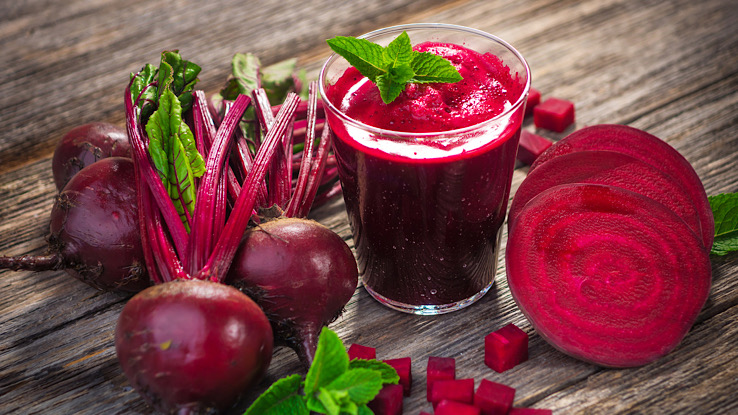
Beet juice is celebrated as a superfood. It is becoming more popular as the health benefits of beet juice are discussed in health and nutrition forums. Even some athletes take it as a nutritional supplement. So you may be thinking about trying beet juice but are unsure of the health benefits. Here is what beets can do for you.
What’s in Beet Juice Anyway?
Beet juice is made by juicing or pureeing raw beetroot with water. Compared to cooked beets, raw beet juice has more health benefits. This is because it keeps a high level of nutrients, including:
- Nitrates that are good for lowering blood pressure, keeping your heart healthy, improving metabolism, and improving exercise performance.
- Betalain which are pigments that have antioxidant properties that reduce inflammation and protect your liver.
- Vitamin C that improve how your immune system works contributes to cell repair
- Potassium that balances electrolytes, regulates muscle contractions, and improves nerve signaling
- Fiber which is good for digestion and gut health
Heart Health
Beets are rich in nitrate. Our bodies convert nitrate to nitric oxide, a molecule that plays an important role in relaxing blood vessels and improving blood flow. Studies suggest that daily beet juice for one week may significantly improve endurance and blood pressure in people suffering from mild heart failure. People without heart failure can also benefit from beet juice’s positive impact on lowering blood pressure and preserving the lining of blood vessels.
Athletic Performance
One of the most studied benefits of beet juice is its impact on athletic performance. Several studies have found that drinking beet juice can be associated with:
- Improved muscle endurance
- Better performance in resistance training
- Faster and more powerful sprinting times among runners
- Improved performance with short rest periods like team sports
More research is needed to know the best timing and how much beet juice can improve athletic performance. But some study has shown improvements in as little as 7 days of taking a beetroot supplement. The expert consensus is that dietary nitrate supplementation with products like beet juice is likely not harmful and is considered a performance supplement.
Gut Health
Our bodies have learned to live in harmony with micro-organisms such as bacteria through evolution. The different types of bacteria that naturally live in our guts are collectively called the microbiome. These bacteria help our bodies function and remain healthy. Beet juice has been shown to help keep a good balance of the gut microbiome. Like other roots and vegetables, Beets also have a high fiber content, which helps keep your gut healthy and prevent constipation.
General Health
Have you ever noticed your urine or stools turn red after eating beets? That’s because beets are rich in natural pigments called betalains. Betalains have important properties that protect you and may prevent some health conditions from getting worse, such as cardiovascular disease, asthma, or obesity. The temporary coloring of your urine is harmless. Still, if it bothers you, it could be avoided by consuming yellow or golden beets instead. If you continue to notice the red coloring of your urine or stool even when you haven’t had beet products, talk to your doctor.
Beets also contain essential minerals and vitamins such as:
- Vitamin C which can help boost your body’s immunity and wound healing
- Potassium which is important for your health and keeping a healthy heartbeat.
What Else To Consider Before Trying Beet Juice

While science shows some important benefits of drinking beet juice, the jury is still out on the optimal drinking amount and frequency. Proceed with moderation, and if you’re thinking of introducing beet juice into your routine, be sure to check with your doctor before making it a regular part of your diet if:
- You have a previous history of kidney stones, as beets are rich in calcium oxalate. And high amounts of calcium oxalate can cause kidney stones.
- You plan to buy it on your own. Many different beet-based products are available for you to buy, but know that dose can differ significantly between brands. Some beverages may also have high sugar content.
- You are taking other medications. These dietary supplements can also interact with other nutritional additives or medications you may be taking.
Resource Links
- “The Health Benefits of Beets” via Cleveland Clinic
- “Effects of Beetroot Juice Supplementation on Cardiorespiratory Endurance in Athletes. A Systematic Review” via Nutrients
- “Role of Oral and Gut Microbiota in Dietary Nitrate Metabolism and Its Impact on Sports Performance” via Nutrients
- “What’s in Your Beet Juice? Nitrate and Nitrite Content of Beet Juice Products Marketed to Athletes” via International Journal of Sport Nutrition and Exercise Metabolism
- “A review on bioactive compounds of beet ( Beta vulgaris L. subsp. vulgaris) with special emphasis on their beneficial effects on gut microbiota and gastrointestinal health” via Critical Reviews in Food Science and Nutrition
- “Effect of 1-week betalain-rich beetroot concentrate supplementation on cycling performance and select physiological parameters” via European Journal of Applied Physiology
- “Effects of Beetroot Juice Supplementation on Cardiorespiratory Endurance in Athletes. A Systematic Review” via Nutrients
- “Effectiveness of beetroot juice derived nitrates supplementation on fatigue resistance during repeated-sprints: a systematic review” via Critical Reviews in Food Science and Nutrition
- “Effects of beetroot juice supplementation on intermittent high-intensity exercise efforts” via International Journal of Sport Nutrition and Exercise Metabolism





